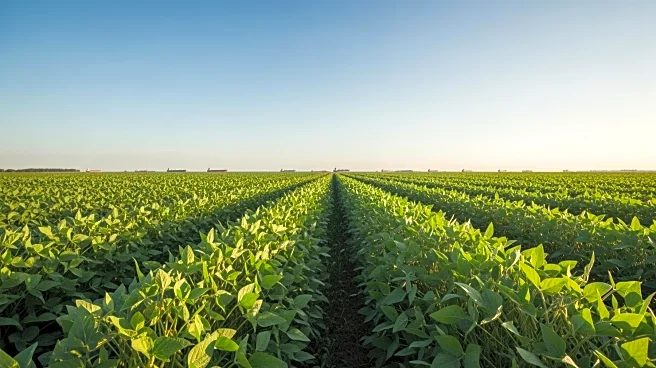What's Happening?
Brazilian farmers are projected to harvest a record 177.64 million metric tons of soybeans in the 2025/26 season, according to crop agency Conab. This forecast represents an increase of approximately 6 million tons compared
to the previous year. The growth is attributed to a 3.6% rise in the area sown with soybeans, totaling 49 million hectares. Brazilian exports are anticipated to exceed 112 million tons, driven by reduced U.S. soy exports amid ongoing trade tensions with China. The states of Parana and Mato Grosso are leading in planting progress, with significant portions of their fields already sown.
Why It's Important?
The record soybean harvest in Brazil is significant for global agricultural markets, particularly in light of the U.S.-China trade tensions. As the U.S. reduces its soy exports, Brazil's increased production and export capacity could strengthen its position as a leading supplier in the global market. This shift may impact U.S. farmers and exporters, potentially leading to changes in trade policies and market dynamics. Additionally, Brazil's agricultural sector stands to benefit economically from increased exports, supporting local economies and contributing to national growth.
What's Next?
Brazilian farmers will continue to monitor weather conditions, as the return of rains in October is crucial for the successful growth of the soybean crop. The focus will also be on the second corn crop, which is planted after soybeans and represents a significant portion of Brazil's agricultural output. As Brazil's exports increase, stakeholders will likely assess the impact on global soy prices and trade relations, particularly with China. The U.S. may need to explore alternative markets or strategies to mitigate the effects of reduced exports.
Beyond the Headlines
The expansion of Brazil's soybean production raises questions about environmental sustainability and land use practices. The increase in agricultural land may lead to deforestation and habitat loss, impacting biodiversity and contributing to climate change. Additionally, the reliance on monoculture crops like soybeans could affect soil health and long-term agricultural productivity. These environmental considerations may prompt discussions on sustainable farming practices and policies to balance economic growth with ecological preservation.










